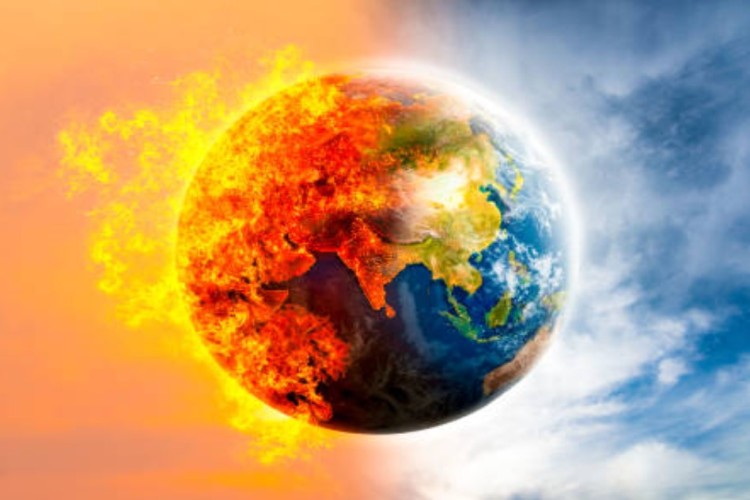Global warming is speeding up: The world set yet another monthly heat record in January 2025, despite predictions of a slight cooling trend due to La Niña. According to the European climate service Copernicus, global temperatures in January 2025 were 0.09 degrees Celsius warmer than in January 2024, marking an increase of 1.75 degrees Celsius above pre-industrial levels. The past 19 months have seen 18 instances of global temperatures hitting or exceeding the internationally agreed warming limit of 1.5 degrees Celsius.
Surprisingly, even with the natural cooling effect of La Niña, global temperatures have remained exceptionally high. This suggests that factors beyond natural climate cycles are at play. Scientists attribute this to the continued buildup of greenhouse gases from human activities, particularly the burning of fossil fuels.
READ | Fiscal paralysis: Welfare funds lie idle while millions struggle
Global warming is accelerating
A new study by former NASA scientist James Hansen and colleagues argues that global warming is accelerating at a rate much higher than previously estimated. According to their research, the past 15 years have warmed at nearly twice the rate of the previous 40 years. This assertion, however, is divisive within the climate research community. While some scientists agree that the rate of warming has increased, others argue that the trend remains within expected climate model projections.
Hansen and his team highlight key overlooked factors that may be driving this acceleration. One major factor is a 2020 regulatory change that reduced sulphur emissions from shipping. While this regulation improved air quality, it also removed a cooling effect that had been reflecting sunlight away from Earth. Another concern is the potential collapse of the Atlantic Meridional Overturning Circulation within the next two to three decades, which could significantly disrupt global climate patterns.
Arctic meltdown and its global impact
One of the most alarming findings in recent climate reports is the rapid warming of the Arctic, which is occurring nearly four times faster than the global average. This has led to unprecedented ice melt, with the Arctic experiencing record-low sea ice levels in January 2025.
Scientists warn that the loss of Arctic ice contributes to a dangerous feedback loop: as ice melts, it exposes dark ocean water, which absorbs more heat and accelerates further melting. Additionally, thawing permafrost releases methane, a potent greenhouse gas, exacerbating climate change. This phenomenon was largely underestimated in climate models, but it is now evident that the Arctic’s changes are influencing global weather patterns and accelerating warming worldwide.
2°C target may be beyond reach
The Paris Climate Agreement set a goal to limit global temperature rise to below 2 degrees Celsius, with an aspirational target of 1.5 degrees. However, new research suggests that this goal is no longer feasible. Hansen and his colleagues have declared that “the 2°C target is dead,” citing continued reliance on fossil fuels and the slow transition to clean energy as primary reasons.
Even if all countries fulfil their current climate pledges, projections indicate that global temperatures will rise by 2.7 degrees Celsius by the end of the century. This stark reality highlights the need for stronger climate policies, aggressive emissions reductions, and urgent adaptation strategies.
Consequences of unchecked global warming
The rising global temperatures are already leading to devastating consequences. Extreme weather events, including heatwaves, droughts, wildfires, and hurricanes, are becoming more frequent and severe. These events threaten food and water security, force mass migrations, and put immense strain on public health systems. Additionally, the loss of biodiversity due to changing ecosystems further compounds the crisis.
Despite these alarming trends, there is still a window of opportunity to slow global warming. The most effective action is a swift transition away from fossil fuels toward renewable energy sources like solar, wind, and nuclear power. Governments must accelerate policy measures to phase out coal, oil, and gas while investing in sustainable infrastructure. But the world is witnessing a renewed interest on fossil fuels from the three largest emitters – China, the US, and India.
On an individual level, reducing personal carbon footprints by using public transportation, adopting energy-efficient practices, and supporting local sustainability initiatives can make a difference. Civic engagement is also crucial—pushing for climate-friendly policies at local, national, and international levels can help drive systemic change.
The latest climate reports serve as a sobering wake-up call. The world is not moving fast enough to mitigate climate change, and without immediate, drastic action, we may soon cross irreversible tipping points. Policymakers, industries, and individuals must work collectively to adapt to the changing climate while aggressively reducing greenhouse gas emissions.

